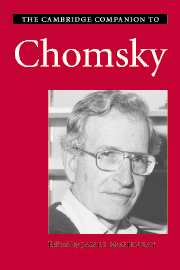Book contents
9 - Mind, language, and the limits of inquiry
from Part II - Chomsky on the human mind
Published online by Cambridge University Press: 28 May 2007
Summary
This chapter explores a very general philosophical and methodological theme in Noam Chomsky’s work - the scope and limit of scientific inquiry in the study of mind and language. It is a conspicuous fact about Chomsky that accompanying the vast and driving intellectual ambition of his program in what he conceives as the science of linguistics is a notable and explicit modesty about the extent to which he thinks he has given, indeed the extent to which one can give, scientific answers to fundamental questions. This modesty in terms of breadth of coverage is in a sense the other side of, and therefore indispensable to, the depth of what he has achieved in the area he has covered.
In his work, he seems to offer at least two different sorts of reasons for us to be made modest about ourselves as inquirers. First there is a modesty implicit in his guardedness about claiming for semantics what some other philosophers have claimed for it, and what he himself has claimed only for syntax understood in a broad sense viz., that there is in some interesting sense an explanatory theory to be offered which can be incorporated into the science of linguistics. Second, there are reasons for modesty having to do with the fact that either because of our conceptual limitations or because of faulty formulations of questions, we are in no position to give serious and detailed answers to them. The next two sections will take up each of these in turn.
- Type
- Chapter
- Information
- The Cambridge Companion to Chomsky , pp. 181 - 203Publisher: Cambridge University PressPrint publication year: 2005
- 2
- Cited by



